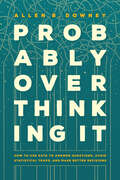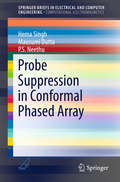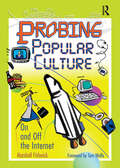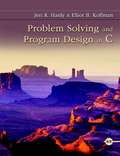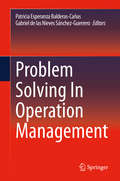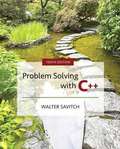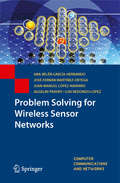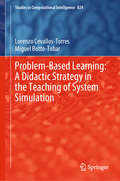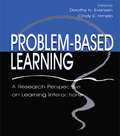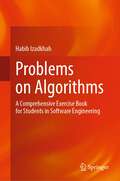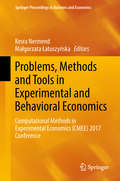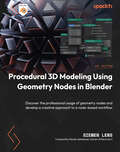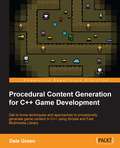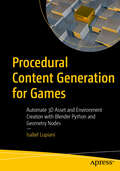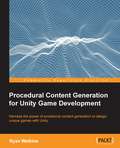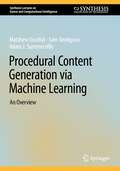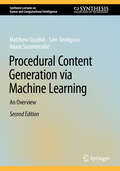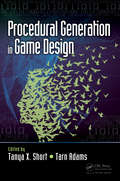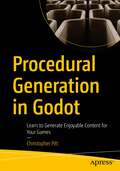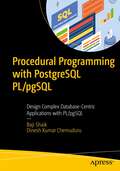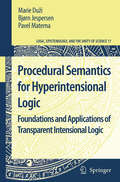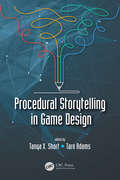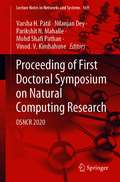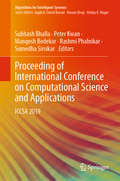- Table View
- List View
Probably Approximately Correct: Nature's Algorithms for Learning and Prospering in a Complex World
by Leslie ValiantWe have effective theories for very few things. Gravity is one, electromagnetism another. But for most thingsOCowhether as mundane as finding a mate or as major as managing an economyOCoour theories are lousy or nonexistent. Fortunately, we donOCOt need them, any more than a fish needs a theory of water to swim; weOCOre able to muddle through. But how do we do it? In "Probably Approximately Correct," computer scientist Leslie Valiant presents a theory of the theoryless. The key is OC probably approximately correctOCO learning, ValiantOCOs model of how anything can act without needing to understand what is going on. The study of probably approximately correct algorithms reveals the shared computational nature of evolution and cognition, indicates how computers might possess authentic intelligence, and shows why hacking a problem can be far more effective than developing a theory to explain it. After all, finding a mate is a lot more satisfying than finding a theory of mating. Offering an elegant, powerful model that encompasses all of lifeOCOs complexity, "Probably Approximately Correct" will revolutionize the way we look at the universeOCOs greatest mysteries.
Probably Overthinking It: How to Use Data to Answer Questions, Avoid Statistical Traps, and Make Better Decisions
by Allen B. Downey&“A delightful exposition of commonly-encountered statistical fallacies and paradoxes and why they matter.&” —Samuel H. Preston, coauthor of Demography: Measuring and Modeling Population Processes An essential guide to the ways data can improve decision making. Statistics are everywhere: in news reports, at the doctor&’s office, and in every sort of forecast, from the stock market to the weather. Allen B. Downey knows well that people have an innate ability both to understand statistics and to be fooled by them. As he makes clear in this accessible introduction to statistical thinking, the stakes are big. Simple misunderstandings have led to incorrect medical prognoses, underestimated the likelihood of earthquakes, hindered social justice efforts, and resulted in dubious policy decisions. There are right and wrong ways to look at numbers, and Downey will help you see which are which. Probably Overthinking It uses real data to delve into real examples, drawing on cases from health campaigns, political movements, and more, shining a light on what we learn when we interpret data correctly, and what goes wrong when we don&’t. Even if you have never studied statistics—or if you have and forgot everything you learned—this book will offer new insight into the methods and measurements that help us understand the world. &“Downey&’s pure love for the subject shines through abundantly, as does his social conscience and belief in the importance of statistical methods to illuminate the greatest, most challenging issues of our time.&” —Aubrey Clayton, author of Bernoulli&’s Fallacy: Statistical Illogic and the Crisis of Modern Science &“[Downey&’s] style is lively and designed to appeal to the curious reader.&” —Choice
Probe Suppression in Conformal Phased Array
by Hema Singh Mausumi Dutta P. S. NeethuThis book considers a cylindrical phased array with microstrip patch antenna elements and half-wavelength dipole antenna elements. The effect of platform and mutual coupling effect is included in the analysis. The non-planar geometry is tackled by using Euler's transformation towards the calculation of array manifold. Results are presented for both conducting and dielectric cylinder. The optimal weights obtained are used to generate adapted pattern according to a given signal scenario. It is shown that array along with adaptive algorithm is able to cater to an arbitrary signal environment even when the platform effect and mutual coupling is taken into account. This book provides a step-by-step approach for analyzing the probe suppression in non-planar geometry. Its detailed illustrations and analysis will be a useful text for graduate and research students, scientists and engineers working in the area of phased arrays, low-observables and stealth technology.
Probing Popular Culture: On and Off the Internet
by Marshall Fishwick"When it comes to seeing depth and lateral connections in the development of popular culture, nobody exceeds Marshall Fishwick." -Canadian Psychology In Probing Popular Culture: On and Off the Internet, one of the leading authorities in American and popular culture studies presents an eye-opening examination o
Problem Solving And Program Design In C
by Jeri Hanly Elliot KoffmanProblem Solving and Program Design in C teaches readers to program with ANSI-C, a standardized, industrial-strength programming language known for its power and probability. The text uses widely accepted software engineering methods to teach readers to design cohesive, adaptable, and reusable program solution modules with ANSI-C. Through case studies and real world examples, readers are able to envision a professional career in programming.
Problem Solving In Operation Management
by Patricia Esperanza Balderas-Cañas Gabriel de las Nieves Sánchez-GuerreroThis volume examines problem solving and applied systems aimed at improving performance and management of organizations. The book’s eight chapters are integrated into two parts: methodologies and techniques that discuss complex dynamic analysis of the organizations, participative processes for building trend scenarios, consultancy as a systemic intervention process, processes to promote innovative goals in organizations, and analytical processes and solid mathematical representation systems. The authors also include a model to urban parks location, an analytic model to urban services location, and a system to forecast demand with fussy sets.Describes methodologies to analyze processes in complex dynamic organizations, including as participative, interventional, innovative, and analytical approaches;Clarifies a strategies for providing structure to complex organizations and applying analytical methods to decision making;Illustrates problem holistic solving strategies;Explains how to approach several problems from a holistic point of view and how analyze the subjacent processes to make decisions.
Problem Solving With C++ (Tenth Edition)
by Walter Savitch Kenrick MockNow in its 10th Edition, Problem Solving with C++ is written for the beginning programmer. The text cultivates strong problem-solving skills and programming techniques as it introduces readers to the C++ programming language. Author Walt Savitch's approach to programming emphasizes active reading through the use of well-placed examples and self-tests, while flexible coverage means the order of chapters and sections can easily be adapted without sacrificing continuity. Savitch's clear, concise style is a hallmark feature of the text and is supported by a suite of tried-and-true pedagogical tools. The 10th Edition includes ten new Programming Projects, along with new discussions and revisions.
Problem Solving for Wireless Sensor Networks
by Ana-Belén García-Hernando Juan-Manuel López-Navarro Aggeliki Prayati Luis Redondo-López José-Fernán Martínez-OrtegaProblem Solving for Wireless Sensor Networks delivers a comprehensive review of the state of the art in the most important technological issues related to Wireless Sensor Networks (WSN). It covers topics such as hardware platforms, radio technologies, software technologies (including middleware), and network and deployment aspects. This book discusses the main open issues inside each of these categories and identifies innovations considered most interesting for future research. Features: - Hardware Platforms in WSN, - Software Technologies in SWN, - Network Aspects and Deployment in WSN, - Standards and Safety Regulation for WSN, - European Projects Related to WSN, - WSN Application Scenarios at both utility and technical levels. Complete, cutting-edge and resulting from the work of many recognized researchers, Problem Solving for Wireless Sensor Networks is an invaluable reference for graduates and researchers, as well as practitioners.
Problem-Based Learning: A Didactic Strategy in the Teaching of System Simulation (Studies in Computational Intelligence #824)
by Miguel Botto-Tobar Lorenzo Cevallos-TorresThis book describes and outlines the theoretical foundations of system simulation in teaching, and as a practical contribution to teaching-and-learning models. It presents various methodologies used in teaching, the goal being to solve real-life problems by creating simulation models and probability distributions that allow correlations to be drawn between a real model and a simulated model. Moreover, the book demonstrates the role of simulation in decision-making processes connected to teaching and learning.
Problem-based Learning: A Research Perspective on Learning Interactions
by Cindy E. Hmelo-Silver Dorothy H. Evensen Cindy E. HmeloThis volume collects recent studies conducted within the area of medical education that investigate two of the critical components of problem-based curricula--the group meeting and self-directed learning--and demonstrates that understanding these complex phenomena is critical to the operation of this innovative curriculum. It is the editors' contention that it is these components of problem-based learning that connect the initiating "problem" with the process of effective "learning." Revealing how this occurs is the task taken on by researchers contributing to this volume. The studies include use of self-reports, interviews, observations, verbal protocols, and micro-analysis to find ways into the psychological processes and sociological contexts that constitute the world of problem-based learning.
Problems on Algorithms: A Comprehensive Exercise Book for Students in Software Engineering
by Habib IzadkhahWith approximately 2500 problems, this book provides a collection of practical problems on the basic and advanced data structures, design, and analysis of algorithms. To make this book suitable for self-instruction, about one-third of the algorithms are supported by solutions, and some others are supported by hints and comments. This book is intended for students wishing to deepen their knowledge of algorithm design in an undergraduate or beginning graduate class on algorithms, for those teaching courses in this area, for use by practicing programmers who wish to hone and expand their skills, and as a self-study text for graduate students who are preparing for the qualifying examination on algorithms for a Ph.D. program in Computer Science or Computer Engineering. About all, it is a good source for exam problems for those who teach algorithms and data structure. The format of each chapter is just a little bit of instruction followed by lots of problems. This book is intended to augment the problem sets found in any standard algorithms textbook. This book • begins with four chapters on background material that most algorithms instructors would like their students to have mastered before setting foot in an algorithms class. The introductory chapters include mathematical induction, complexity notations, recurrence relations, and basic algorithm analysis methods. • provides many problems on basic and advanced data structures including basic data structures (arrays, stack, queue, and linked list), hash, tree, search, and sorting algorithms. • provides many problems on algorithm design techniques: divide and conquer, dynamic programming, greedy algorithms, graph algorithms, and backtracking algorithms. • is rounded out with a chapter on NP-completeness.
Problems, Methods and Tools in Experimental and Behavioral Economics: Computational Methods in Experimental Economics (CMEE) 2017 Conference (Springer Proceedings in Business and Economics)
by Kesra Nermend Małgorzata ŁatuszyńskaThese proceedings highlight research on the latest trends and methods in experimental and behavioral economics. Featuring contributions presented at the 2017 Computational Methods in Experimental Economics (CMEE) conference, which was held in Lublin, Poland, it merges findings from various domains to present deep insights into topics such as game theory, decision theory, cognitive neuroscience and artificial intelligence. The fields of experimental economics and behavioral economics are rapidly evolving. Modern applications of experimental economics require the integration of know-how from disciplines including economics, computer science, psychology and neuroscience. The use of computer technology enhances researchers’ ability to generate and analyze large amounts of data, allowing them to use non-standard methods of data logging for experiments such as cognitive neuronal methods. Experiments are currently being conducted with software that, on the one hand, provides interaction with the people involved in experiments, and on the other helps to accurately record their responses. The goal of the CMEE conference and the papers presented here is to provide the scientific community with essential research on and applications of computer methods in experimental economics. Combining theories, methods and regional case studies, the book offers a valuable resource for all researchers, scholars and policymakers in the areas of experimental and behavioral economics.
Procedural 3D Modeling Using Geometry Nodes in Blender: Discover the professional usage of geometry nodes and develop a creative approach to a node-based workflow
by Siemen Lens Wouter AdriaensenAn easy-to-follow, illustrated guide to learning the geometry nodes editor and various other facets of geometry nodes through simple exercises that progress to more challenging projectsPurchase of the print or Kindle book includes a free PDF eBookKey FeaturesDevelop a creative mathematical thinking of the modeling workflowUnderstand how Blender and geometry nodes store and manage the data that you are handlingLearn different scatter methods and how to use themBook DescriptionFor anyone working in the computer graphics industry, understanding how to use Blender's new geometry nodes tools to manipulate and generate 3D geometry in a node-based workflow is an essential skill. In this book, you'll learn how to use the basic and intermediate features of geometry nodes that are a crucial part of your Blender roadmap.You'll start by understanding the different node inputs and outputs followed by the basic nodes you'll need throughout your geometry nodes projects. The book will show you how the node system works and enable you to put your newfound knowledge to use through exercises that involve modifying curves, meshes, and more. You'll work on a range of interesting projects such as creating a procedural plant, where you'll use nodes to generate the intricate details and variations of a plant in a procedural manner, and a spiderweb generator to refine your skills of cleaning up a node tree. Finally, you'll build a procedural LED panel using geometry nodes to generate the look of an LED panel.By the end of this book, you'll be able to overcome any geometry node issue confidently and make complicated geometry node trees exactly how you need them.What you will learnDiscover the different node inputs and outputs that geometry nodes have to offerGet the hang of the flow of the geometry node systemUnderstand the common nodes you'll be using along with their functions in the geometry node editorModify basic mesh primitives using the node system inside BlenderScatter and modify objects aligned onto a curveBecome familiar with the more advanced nodes in the geometry nodes systemLink geometry and material nodes editors using named attributesImplement your new-found knowledge of nodes in real-world projectsWho this book is forIf you are a CG Artist or follow modeling careers like that of an environment artist or even a CG generalist in the cinematography industry and you are looking to get into learning a node-based modeling workflow using Geometry Nodes in Blender, this is the perfect book for you. You will need a basic knowledge of the fundamentals of Blender, for example, knowing the specific workflow of material nodes and being able to apply this knowledge to your projects. To get the most out of this book, you should have a basic understanding of Blender's shortcut system and some modeling experience.
Procedural Content Generation for C++ Game Development
by Dale GreenGet to know techniques and approaches to procedurally generate game content in C++ using Simple and Fast Multimedia Library About This Book * This book contains a bespoke Simple and Fast Multimedia Library (SFML) game engine with complete online documentation * Through this book, you'll create games that are non-predictable and dynamic and have a high replayability factor * Get a breakdown of the key techniques and approaches applied to a real game. Who This Book Is For If you are a game developer who is familiar with C++ and is looking to create bigger and more dynamic games, then this book is for you. The book assumes some prior experience with C++, but any intermediate concepts are clarified in detail. No prior experience with SFML is required. What You Will Learn * Discover the systems and ideology that lie at the heart of procedural systems * Use Random number generation (RNG) with C++ data types to create random but controlled results * Build levels procedurally with randomly located items and events * Create dynamic game objects at runtime * Construct games using a component-based approach * Assemble non-predictable game events and scenarios * Operate procedural generation to create dynamic content fast and easily * Generate game environments for endless replayability In Detail Procedural generation is a growing trend in game development. It allows developers to create games that are bigger and more dynamic, giving the games a higher level of replayability. Procedural generation isn't just one technique, it's a collection of techniques and approaches that are used together to create dynamic systems and objects. C++ is the industry-standard programming language to write computer games. It's at the heart of most engines, and is incredibly powerful. SFML is an easy-to-use, cross-platform, and open-source multimedia library. Access to computer hardware is broken into succinct modules, making it a great choice if you want to develop cross-platform games with ease. Using C++ and SFML technologies, this book will guide you through the techniques and approaches used to generate content procedurally within game development. Throughout the course of this book, we'll look at examples of these technologies, starting with setting up a roguelike project using the C++ template. We'll then move on to using RNG with C++ data types and randomly scattering objects within a game map. We will create simple console examples to implement in a real game by creating unique and randomised game items, dynamic sprites, and effects, and procedurally generating game events. Then we will walk you through generating random game maps. At the end, we will have a retrospective look at the project. By the end of the book, not only will you have a solid understanding of procedural generation, but you'll also have a working roguelike game that you will have extended using the examples provided. Style and approach This is an easy-to-follow guide where each topic is explained clearly and thoroughly through the use of a bespoke example, then implemented in a real game project.
Procedural Content Generation for Games: Automate 3D Asset and Environment Creation with Blender Python and Geometry Nodes
by Isabel LupianiLearn to procedurally generate 3D content for your next game or simulation using the Blender Python API and geometry nodes. Automate parts of your asset creation pipeline while producing a starter library of environments, weapons, and other objects ready to use in your next Unreal project. You will start by getting comfortable with generating geometry in Blender Python by automating hand modeling basics, like blocking out weapon meshes by combining primitives and manipulating them with your favorite operators and modifiers. After that you&’ll take a deep dive in geometry nodes and tackle projects such as adding Voronoi cracks and creating sliceform versions of any mesh. Building on your Blender Python skills, you&’ll progress to fractal methods for generating realistic terrain, followed by grammar-based approaches such as L-systems for producing lifelike plants. Prefer environments based on real-world locations? Find out how to generate 3D contents based on GIS data, such as city skylines from building footprints, and 3D terrain from Digital Elevation Models (DEM). Along the way, you will also learn techniques for incorporating parametric modeling into your procedural system to optionally control chosen aspects of the generation process, to ensure that only meaningful variations coherent with the overall design are produced. Whether you are looking to generate stylized content that aligns with your artistic vision, or realistic environments true to their real-world counterparts, this book will add a variety of practical (and fun) techniques to your procedural generation arsenal. What You Will Learn ● Automate 3D modeling steps traditionally done by hand with the Blender Python API and geometry nodes <p class="MsoNormal" style="text-indent: -18.0pt; line-height: normal; mso-pagination: widow-orphan; mso-list: l0 level1 l
Procedural Content Generation for Unity Game Development
by Ryan WatkinsHarness the power of procedural content generation to design unique games with Unity About This Book * Learn the basics of PCG development * Develop a 2D game from start to finish * Explore all the different ways PCG can be applied in games Who This Book Is For This book is for Unity game developers, especially those who work on indie games. You should be familiar with Unity and C# scripting but you'll be able to jump in and start learning PCG straightaway. What You Will Learn * Understand the theory of Procedural Content Generation * Learn the uses of Pseudo Random Numbers * Create reusable algorithm designs for PCG * Evaluate the data structures for PCG * Develop smaller games with larger amounts of content * Generate content instead of spending time designing every minute detail * Learn when and how to add PCG to your game * Learn the fundamental techniques of PCG In Detail Procedural Content Generation is a process by which game content is developed using computer algorithms, rather than through the manual efforts of game developers. This book teaches readers how to develop algorithms for procedural generation that they can use in their own games. These concepts are put into practice using C# and Unity is used as the game development engine. This book provides the fundamentals of learning and continued learning using PCG. You'll discover the theory of PCG and the mighty Pseudo Random Number Generator. Random numbers such as die rolls and card drafting provide the chance factor that makes games fun and supplies spontaneity. This book also takes you through the full development of a 2D game. Starting with level generation, you'll learn how PCG can make the game environment for you. You'll move into item generation and learn the different techniques to procedurally create game items. Thereafter, you'll be guided through the more abstract PCG areas such as scaling difficulty to the player and even generating music! The book helps you set up systems within your games where algorithms create computationally generated levels, art assets, quests, stories, characters, and weapons; these can substantially reduce the burden of manually creating every aspect of the game. Finally, you'll get to try out your new PCG skills on 3D terrain generation. Style and approach An easy-to-follow, project-based guide that will let you build a complete game by the end of the book using PCG.
Procedural Content Generation via Machine Learning: An Overview (Synthesis Lectures on Games and Computational Intelligence)
by Matthew Guzdial Sam Snodgrass Adam J. SummervilleThis book surveys current and future approaches to generating video game content with machine learning or Procedural Content Generation via Machine Learning (PCGML). Machine learning is having a major impact on many industries, including the video game industry. PCGML addresses the use of computers to generate new types of content for video games (game levels, quests, characters, etc.) by learning from existing content. The authors illustrate how PCGML is poised to transform the video games industry and provide the first ever beginner-focused guide to PCGML. This book features an accessible introduction to machine learning topics, and readers will gain a broad understanding of currently employed PCGML approaches in academia and industry. The authors provide guidance on how best to set up a PCGML project and identify open problems appropriate for a research project or thesis. This book is written with machine learning and games novices in mind and includes discussions of practical and ethical considerations along with resources and guidance for starting a new PCGML project.
Procedural Content Generation via Machine Learning: An Overview (Synthesis Lectures on Games and Computational Intelligence)
by Matthew Guzdial Sam Snodgrass Adam SummervilleThis second edition updates and expands upon the first beginner-focused guide to Procedural Content Generation via Machine Learning (PCGML), which is the use of computers to generate new types of content for video games (game levels, quests, characters, etc.) by learning from existing content. The authors survey current and future approaches to generating video game content and illustrate the major impact that PCGML has had on video games industry. In order to provide the most up-to-date information, this new edition incorporates the last two years of research and advancements in this rapidly developing area. The book guides readers on how best to set up a PCGML project and identify open problems appropriate for a research project or thesis. The authors discuss the practical and ethical considerations for PCGML projects and demonstrate how to avoid the common pitfalls. This second edition also introduces a new chapter on Generative AI, which covers the benefits, risks, and methods for applying pre-trained transformers to PCG problems.
Procedural Generation in Game Design
by Tarn Adams Tanya ShortMaking a game can be an intensive process, and if not planned accurately can easily run over budget. The use of procedural generation in game design can help with the intricate and multifarious aspects of game development; thus facilitating cost reduction. This form of development enables games to create their play areas, objects and stories based on a set of rules, rather than relying on the developer to handcraft each element individually. Readers will learn to create randomized maps, weave accidental plotlines, and manage complex systems that are prone to unpredictable behavior. Tanya Short’s and Tarn Adams’ Procedural Generation in Game Design offers a wide collection of chapters from various experts that cover the implementation and enactment of procedural generation in games. Designers from a variety of studios provide concrete examples from their games to illustrate the many facets of this emerging sub-discipline. <P><P>Key Features: <li>Introduces the differences between static/traditional game design and procedural game design <li>Demonstrates how to solve or avoid common problems with procedural game design in a variety of concrete ways <li>Includes industry leaders’ experiences and lessons from award-winning games <li>World’s finest guide for how to begin thinking about procedural design
Procedural Generation in Godot: Learn to Generate Enjoyable Content for Your Games
by Christopher PittLearn the tricks of simple procedural generation and how various genres, such as racing simulators, platformers, and roguelikes, can all benefit from these techniques. In this book, you'll learn how to combine hand-crafted content with algorithms to create immersive and beautiful environments. You'll learn how to create a seeding system, so that you can replay great levels with your friends. We'll cover how to create good tilesets, how to use the tilemap editor effectively, and how to inject just the right amount of logic into an otherwise automated machine that is your own personal procedural content generation engine. We will use 2D examples to demonstrate the concepts covered throughout the book. By the time you complete this book, you’ll have a good handle on how to add procedural generation to your games. What You Will LearnLearn to set up the perfect content generation system Master the tools for randomization and repeatabilityUnderstand how much content to craft versus how much to generateWho This Book Is ForBasic familiarity with the Godot engine and GDScript is essential. While all concepts are explained in the book, it can be overwhelming learning these techniques at the same time as learning the engine.
Procedural Programming with PostgreSQL PL/pgSQL: Design Complex Database-Centric Applications with PL/pgSQL
by Baji Shaik Dinesh Kumar ChemuduruLearn the fundamentals of PL/PGSQL, the programming language of PostgreSQL which is most robust Open Source Relational Database. This book provides practical insights into developing database code objects such as functions and procedures, with a focus on effectively handling strings, numbers, and arrays to achieve desired outcomes, and transaction management.The unique approach to handling Triggers in PostgreSQL ensures that both functionality and performance are maintained without compromise. You'll gain proficiency in writing inline/anonymous server-side code within the limitations, along with learning essential debugging and profiling techniques. Additionally, the book delves into statistical analysis of PL/PGSQL code and offers valuable knowledge on managing exceptions while writing code blocks. Finally, you'll explore the installation and configuration of extensions to enhance the performance of stored procedures and functions.What You'll LearnUnderstand the PL/PGSQL conceptsLearn to debug, profile, and optimize PL/PGSQL codeStudy linting PL/PGSQL codeReview transaction management within PL/PGSQL codeWork with developer friendly features like operators, casts, and aggregatorsWho Is This Book ForApp developers, database migration consultants, and database administrators.
Procedural Semantics for Hyperintensional Logic
by Marie Duží Bjorn Jespersen Pavel MaternaThe book is about logical analysis of natural language. Since we humans communicate by means of natural language, we need a tool that helps us to understand in a precise manner how the logical and formal mechanisms of natural language work. Moreover, in the age of computers, we need to communicate both with and through computers as well. Transparent Intensional Logic is a tool that is helpful in making our communication and reasoning smooth and precise. It deals with all kinds of linguistic context in a fully compositional and anti-contextual way.
Procedural Storytelling in Game Design
by Tanya X. Short Tarn AdamsThis edited collection of chapters concerns the evolving discipline of procedural storytelling in video games. Games are an interactive medium, and this interplay between author, player and machine provides new and exciting ways to create and tell stories. In each essay, practitioners of this artform demonstrate how traditional storytelling tools such as characterization, world-building, theme, momentum and atmosphere can be adapted to full effect, using specific examples from their games. The reader will learn to construct narrative systems, write procedural dialog, and generate compelling characters with unique personalities and backstories. Key Features Introduces the differences between static/traditional game design and procedural game design Demonstrates how to solve or avoid common problems with procedural game design in a variety of concrete ways World’s finest guide for how to begin thinking about procedural design
Proceeding of First Doctoral Symposium on Natural Computing Research: DSNCR 2020 (Lecture Notes in Networks and Systems #169)
by Nilanjan Dey Parikshit N. Mahalle Varsha H. Patil Mohd Shafi Pathan Vinod. V. KimbahuneThe book is a collection of papers presented at First Doctoral Symposium on Natural Computing Research (DSNCR 2020), held during 8 August 2020 in Pune, India. The book covers different topics of applied and natural computing methods having applications in physical sciences and engineering. The book focuses on computer vision and applications, soft computing, security for Internet of Things, security in heterogeneous networks, signal processing, intelligent transportation system, VLSI design and embedded systems, privacy and confidentiality, big data and cloud computing, bioinformatics and systems biology, remote healthcare, software security, mobile and pervasive computing, biometrics-based authentication, natural language processing, analysis and verification techniques, large scale networking, distributed systems, digital forensics, and human–computer interaction.
Proceeding of International Conference on Computational Science and Applications: ICCSA 2019 (Algorithms for Intelligent Systems)
by Subhash Bhalla Peter Kwan Mangesh Bedekar Rashmi Phalnikar Sumedha SirsikarThe book consists of high-quality papers presented at the International Conference on Computational Science and Applications (ICCSA 2019), held at Maharashtra Institute of Technology World Peace University, Pune, India, from 7 to 9 August 2019. It covers the latest innovations and developments in information and communication technology, discussing topics such as soft computing and intelligent systems, web of sensor networks, drone operating systems, web of sensor networks, wearable smart sensors, automated guided vehicles and many more.

